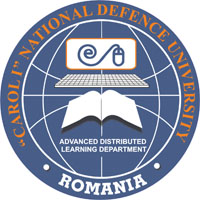TEACHING ESP IN THE DIGITAL ERA: THE USE OF TECHNOLOGY IN PROJECT-BASED LEARNING AND ASSESSMENT
TEACHING ESP IN THE DIGITAL ERA: THE USE OF TECHNOLOGY IN PROJECT-BASED LEARNING AND ASSESSMENT
Author(s): Corina MarculescuSubject(s): Education
Published by: Carol I National Defence University Publishing House
Keywords: project work; real-life tasks; communicative competence; digital revolution; interconnected world; "born digital"
Summary/Abstract: In today’s technological age computers and related electronic resources have come to play a central role in education, in the teaching-learning process. Most students are fully immersed in the "digital revolution" and love web community. The present paper discusses project-based learning (PBL), a dynamic, essentially student-centered approach to teaching which motivates students to explore real-world problems and to learn by discovery (rather than through the textbook-centered learning or through information given directly by the teacher). PBL is a suitable approach for the Generation Y students, offering them the opportunity to work in collaborative teams and to use the digital technology now available. It is also a valuable tool for authentic assessment, reflecting as well the students’ passion, creativity, and self-reliance - qualities that cannot be adequately assessed by multiple-choice tests. Conducted at the Bucharest University of Economic Studies, my research focuses on the use of project work for the purpose of improving the students’ knowledge of English, their written but especially their oral communication skills, through true-to-life activities and tasks (in particular, through performance of job interviews and oral presentations). The outcome of their projects was a role play, or a lively presentation, a poster, a case study, a video clip, a Web site. The study has shown that the incorporation of technology and art into projects and assignments is often the key that inspires and motivates a student to learn. Students respond to images/visuals and find technology engaging and challenging; they love to take the lead in situations (such as technology-supported learning) in which they are actually the experts; they are "born digital"; they use technologies in the most natural way to access information and to create new knowledge and art forms. At the same time in order to ensure a solid foundation, to keep the focus on the subject matter and not on the tools, especially in the case of second-language acquisition, it is recommendable to use a combination of technology-based learning and more traditional teaching styles and types of interaction. Technology properly embedded in a course or relevant to a project or seminar activity along with a well-conceived course material, clear objectives, well explained requirements, relevant tasks, detailed assignments, rigorous project planning - all this represent the key to successful teaching and learning. Students still value 'live' teaching highly; their most important need is actually represented by dedicated, inspiring teachers, by educators, ready to assist and guide them (and learn from them, adopt their digital language) throughout the learning process.
Journal: Conference proceedings of »eLearning and Software for Education« (eLSE)
- Issue Year: 11/2015
- Issue No: 02
- Page Range: 228-235
- Page Count: 8

